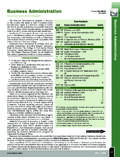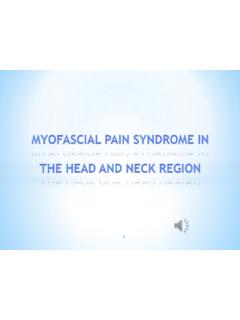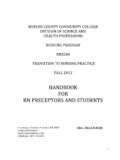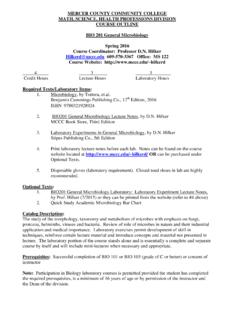Transcription of Foam Rollers and Myofascial Adhesions - MCCC
1 foam Rollers and Myofascial Adhesions Melissa McDonagh Fascia and foam Rollers Recently, there has been a trend in some gyms and therapeutic settings promoting the use of foam Rollers for Self- Myofascial Release techniques. foam Rollers are being touted as tools to improve athletic performance In theory, it would appear that this is a great tool for our patients to learn to use in order to achieve their wellness goals Fascia and foam Rollers YOU GUESSED IT : There are also countless How -To videos on Youtube! showing viewers how to use these Rollers for their various injuries, syndromes or to simply keep muscle soreness/tightness at bay Fascia and foam Rollers This presentation is an attempt to inform us as clinicians about this new trend so we can: Potentially use them to help our patients educate our patients when they ask us about them But first, a little Remember Fascia?
2 Fascia is a fibrous, soft connective tissue that permeates the human body. It acts as a web of tissue that surrounds all components and compartments of the body to maintain integrity, support, and protective structure. This is Fascia What are Adhesions ? When irritated, the fibrous tissue forms Adhesions , decreases compliance of the fascia, limiting circulation through the underlying tissue and inhibit function due to ischemia. (Fama & Buti, 2011) Fascial adhesion Why do we get Adhesions ? Adhesions form for various reasons including disuse, not enough stretching, or injuries, the fascia and the underlying muscle tissue can become stuck together.
3 This is called an adhesion and it results in restricted muscle movement. It also causes pain, soreness and reduced flexibility or range of motion. (Quinn, March 2012) Commonly Used Synonyms for Adhesions KNOT TRIGGER POINT Myofascial TRIGGER POINT Fascia, Adhesions and the kinetic chain So, if fascia is like a body stocking in that it surrounds all of our internal tissues like a web, what does this mean if there s an adhesion a pull in the body stocking? The Kinetic Chain It indicates that perhaps this pull or adhesion is affecting much more than the tissues surrounding it.
4 That maybe it s having an impact on the kinetic chain Kinetic Chain Defined in re: fascia The kinetic chain is the chain of systems that link together to create human movement. It is comprised of the nervous system, the muscular system, and the skeletal system. Kinetic Chain Definition Continued While we define the kinetic chain as three systems that work together to create movement, we must also remember that the entire body must work as an integrated unit ( The Kinetic Chain It s the concept that joints in the body can be causing dysfunction elsewhere.)
5 Kinetic chain is often thought of as each joint in the body being like each link in a chain this is a simplistic version of the kinetic chain in purely the sense of biomechanics and arthrokinematics. (Reinold,2011) The Kinetic Chain Instead, realize that there are many influences on the kinetic chain between each joint. This includes the muscles, fascia, ligaments, tendons, and anything else you can think of. Basically, it s not just the joints, but also everything in between. (Reinold, 2011) What s the point? The Kinetic Chain It indicates that perhaps this pull or adhesion is affecting much more than the tissues surrounding it.
6 That maybe it s having an impact on the kinetic chain Connecting the Dots So, if Myofascial Adhesions negatively affect the kinetic chain, and the kinetic chain is all about the three major systems of the body working together to create movement Maybe foam Rollers breaking up tissue Adhesions is the answer athletes, weekend warriors and their sore muscles have been waiting for Maybe, Maybe In my research I found only one study that pertained to foam Rollers and their efficacy in helping athletes to perform better because they used foam Rollers before and after training sessions Results there was a significant difference between genders on all of the athletic tests (p <= ).
7 As expected there were significant increases from pre to post during both trials for fatigue, soreness, and exertion (p <= ). Post fatigue after foam rolling was significantly less than after the subjects performed planking (p <= ).(Healy, Dorfman, ,2011) Conclusion Conclusion: The results show that 30 seconds of foam rolling on each of the lower-limbs and back had no effect on performance. BUT Post- foam rolling fatigue measures were significantly less than past-planking fatigue measures. Interpretation By planking the article means the athletes studied were doing the exercise known as a plank before jumping performance tests.
8 The test group then performed foam rolling techniques before jumping tests Performances before both tests were compared As stated before, foam rolling helped reduce fatigue Where Do foam Rollers Fit in the Picture? Evidence Based Practice So, should we/do we, now become foam roller proponents or are they ineffective? There needs to be more research since I only found one study with healthy test subjects I think it s intuitive that foam Rollers won t hurt most patients and would probably help many patients with IT band syndrome for example or tight muscles.
9 Warming Up At the very least we can feel comfortable using a foam roller routine before an intervention that would involve stretching and Therex based on the results of the cited study foam roller Techniques Here is an example of the one of the more common exercises and it shows the basic use of a foam roller Who can benefit from this technique? Anybody with Myofascial Adhesions or conditions like IT band syndrome Anyone with sore muscles Who Shouldn t Use foam Rollers By now this list is well known to all of us but to provide some roller specific contraindications.
10 Anyone with Intervertebral Disc problems because of positioning requirements anyone who may have difficulty supporting their own body weight with their arms or legs Who Shouldn t Use foam Rollers Anyone who has osteoporosis or osteoarthritis anyone with cognitive disabilities For a comprehensive list of exercises Resources foam Rollers for Myofascial Release and Massaging Tight Muscles. ( ). Sports Medicine, Sports Performance, Sports Injury - Information About Sports Injuries and Workouts for Athletes. Retrieved from Resources Resources










